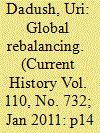| Srl | Item |
| 1 |
ID:
101665


|
|
|
| 2 |
ID:
133649


|
|
|
|
|
| Publication |
2014.
|
| Summary/Abstract |
Why do new EU democracies engage in multilateralism? The dominant explanation proposes that new democracies use international treaties to lock in domestic reforms. This article offers a novel explanation as to why new EU democracies participate in multilateral treaties. We argue that ratifying a treaty serves three external signaling purposes (recognition concerns, increasing strategic autonomy, and pleasing the European Union). We test our argument through a mix of quantitative and qualitative methods. First, we apply event history analysis. Drawing on a new ratification data set comprising 76 multilateral treaties, we illustrate the prominent role of new EU democracies in multilateralism as compared to other new democracies. Second, to assess the importance of external signaling in the decision to ratify multilateral treaties, we examine parliamentary ratification debates in selected Central and Eastern European countries. Third, we compare parliamentary discussions across European and non-European new democracies to demonstrate the different motives driving their approaches toward multilateralism.
|
|
|
|
|
|
|
|
|
|
|
|
|
|
|
|
| 3 |
ID:
141501


|
|
|
|
|
| Summary/Abstract |
Inclusive institutions make correct policy choices required for steady catch-up growth more likely. India started out with highly inclusive political institutions since it adopted democracy with universal suffrage at independence. But extractive economic institutions, inherited from the British, were made more so by economic controls. In addition, a heterogeneous electorate allowed politicians to cultivate vote-banks and populist schemes instead of delivering better public services and governance. India’s opening out was adequately nuanced and flexible but was sometimes used as a substitute for harder domestic reforms. It, however, added to the growing constituencies that benefit from growth, and are pushing for more inclusive productivity enabling economic institutions. Broader interest groups create better institutions and incentives. Examples from general governance, the regulation of industry, and agricultural marketing show the process, although messy and prolonged, is in the right direction.
|
|
|
|
|
|
|
|
|
|
|
|
|
|
|
|